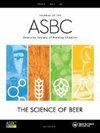Volatile Profile Survey of Five Apple Varieties Grown in Southwest Colorado from Juice to Finished, Dry-Hopped Cider
IF 1.8
4区 农林科学
Q4 BIOTECHNOLOGY & APPLIED MICROBIOLOGY
Journal of the American Society of Brewing Chemists
Pub Date : 2022-01-04
DOI:10.1080/03610470.2021.2013645
引用次数: 3
Abstract
Abstract The volatile organic compounds (VOCs) produced during cider fermentation, maturation, and dry hopping greatly impact enjoyment of the final product. To investigate the effect of apple variety on VOC development in cider, five apple varieties were picked from two orchards in southwest Colorado. Each apple variety was juiced, fermented with Lalvin QA23 Saccharomyces cerevisiae, dry-hopped with Citra hops, and analyzed separately alongside non-dry hopped controls. The aroma attributes of these historical southwest Colorado apples have never been explored, and few studies have chemically profiled the aromas of dry-hopped cider. A total of 73 VOCs were identified using headspace-solid phase microextraction-gas chromatography-mass spectrometry (HS-SPME-GC-MS) from fruit juice to cider. Ethyl esters, acetate esters, higher alcohols, and terpenes were the major aroma contributors observed in dry-hopped cider. The identity and concentrations of VOCs varied greatly between apple varieties, with only 24 common VOCs detected in all samples studied. This indicates the importance of apple variety choice in tuning the aroma profile of the finished cider. This method can be used to more effectively evaluate orchard or cider production treatments on cider quality. This case study also provides practical information for cider makers seeking to improve the quality of their products through consideration of fruit variety and dry hopping. Supplemental data for this article is available online at https://doi.org/10.1080/03610470.2021.2013645 .美国科罗拉多州西南部五个苹果品种从果汁到成品干跳苹果酒的挥发性分析
摘要苹果酒在发酵、成熟和干跳过程中产生的挥发性有机化合物(VOCs)极大地影响了最终产品的口感。为了研究苹果品种对苹果酒中挥发性有机化合物的影响,从美国科罗拉多州西南部的两个果园中采摘了5个苹果品种。每个苹果品种都被榨汁,用Lalvin QA23酿酒酵母发酵,用Citra啤酒花干跳,并与非干跳对照分开分析。这些历史悠久的科罗拉多西南部苹果的香气特征从未被探索过,很少有研究对干啤酒花苹果酒的香气进行化学分析。采用顶空固相微萃取-气相色谱-质谱联用(HS-SPME-GC-MS)技术,从果汁到苹果酒共鉴定出73种挥发性有机化合物。乙酯、乙酸酯、高级醇和萜烯是干跳苹果酒的主要香气来源。挥发性有机化合物的特性和浓度在不同的苹果品种之间差异很大,在所有研究样本中只检测到24种常见的挥发性有机化合物。这表明苹果品种的选择对于调节成品苹果酒的香气非常重要。该方法可以更有效地评价果园或苹果酒生产处理对苹果酒品质的影响。本案例研究也为寻求通过考虑水果品种和干跳来提高产品质量的苹果酒制造商提供了实用信息。本文的补充数据可在https://doi.org/10.1080/03610470.2021.2013645上在线获得。
本文章由计算机程序翻译,如有差异,请以英文原文为准。
求助全文
约1分钟内获得全文
求助全文
来源期刊

Journal of the American Society of Brewing Chemists
工程技术-生物工程与应用微生物
CiteScore
4.00
自引率
20.00%
发文量
41
审稿时长
3 months
期刊介绍:
The Journal of the American Society of Brewing Chemists publishes scientific papers, review articles, and technical reports pertaining to the chemistry, microbiology, and technology of brewing and distilling, as well as the analytical techniques used in the malting, brewing, and distilling industries.
 求助内容:
求助内容: 应助结果提醒方式:
应助结果提醒方式:


